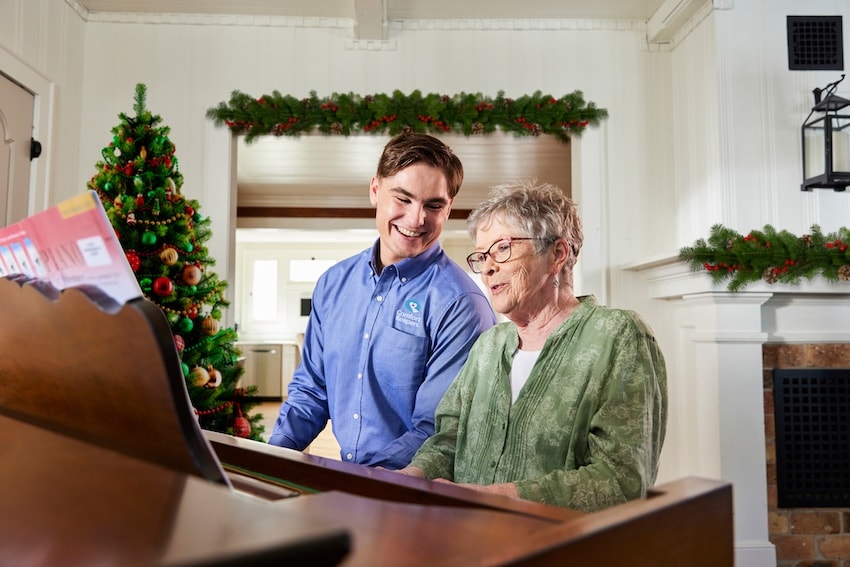Help Seniors with Dementia Stay Engaged with Activities
In the early stages of dementia, many seniors show less interest in what were once their favorite activities, and that can be hard on family and loved ones who want to help them.

In the early stages of dementia, many seniors show less interest in what was once their favorite activities, and that can be hard on the family and loved ones who want to help them. Routine activity, as long as it is carefully planned, can enrich the lives of those affected by dementia and support them in many ways by helping them stay focused and not wander; easing agitation; maintaining proper blood pressure, blood flow, blood sugar, and weight; keeping their minds sharp; potentially slowing down the decline of dementia; warding off depression; and building confidence as they begin to lose some of their abilities. Activities for people with dementia do not have to be strenuous to be beneficial, and senior care experts offer numerous recommendations when planning activities.
Routine activity, as long as it is carefully planned, can enrich the lives of those affected by dementia and support them in many ways by helping them stay focused and not wander; easing agitation; maintaining proper blood pressure, blood flow, blood sugar, and weight; keeping their minds sharp; potentially slowing down the decline of dementia; warding off depression; and building confidence as they begin to lose some of their abilities. Because of these benefits, it is important to provide ongoing opportunities for these seniors to remain engaged.
Activities for people with dementia do not have to be strenuous to be beneficial, and senior care experts offer these recommendations when planning activities:
- Explain the activities beforehand, even if you are not sure the person with dementia can fully understand your instructions.
- Do regular reevaluations of the person's abilities as their dementia progresses so you can adjust his or her activities and avoid frustration or agitation.
- Be aware of limitations, such as eyesight, the need for rest, and times of day that work best for the individual.
- Focus on enjoyment, not achievement and be careful not to criticize or correct the person.
- Let individuals with dementia know they are needed by asking for their help during activities of all kinds.
Some activities that prove beneficial for seniors and help keep them engaged with those around them include the following:
- Talk about past loves and relationships. Most people with dementia can more easily recall events from the past compared to the present. Bring old out scrapbooks, photos and cards to help get and keep a discussion going. Talk about their favorite romantic memories, even crushes from their school days and early dating years.
- Listen to music.
- Create art. Use construction paper, felt, doilies, paints, markers, and stickers to create a work of art. Have the individual sign his or her name on the artwork and give them to facility staff, family, grandkids, and neighbors.
- Bake something sweet. If it is safe, make and decorate cookies using simple recipes or ready-made dough. Just like music, the smells of baking treats might help bring back memories to share.
- Make craft flowers. Offer tissue paper with green pipe cleaners. Have participants cut or fold the paper into flower shapes and then glue them on the pipe cleaners.
- Offer clay as a craft element. Participants can make paperweights or boxes out of clay that can be baked and then painted. Molding clay offers an exercise that will keep fingers and hands strong.
- Make jewelry. Use colorful beads, which can be decorated with glitter or paint, and strings to create gifts such as key chains, or door and window hangers. In addition to exercising hands, beadwork helps improve and retain the ability to manage details.
- Create with fresh flowers. Buy planters and plant succulent and carnation arrangements. For a simpler activity, buy vases and an assortment of fresh flowers and embellishments the senior can assemble.
- Make gift bags to share. Buy decorative cellophane bags and an assortment of chocolates and small gift items for the senior to create gift bags. This is a great activity that keeps seniors with dementia active in sorting items.
Finally, remember to keep it fun. Make sure the activities are in line with the person's interests and adjust them to his or her current ability level to avoid frustration. Plan outdoor activities whenever possible, and be sure to vary activities to include mental and physical stimulation, as well as those that stimulate sight, smell, hearing, and touch. It is also important to maintain a sense of structure even though the activities may be varied. Following these guidelines can offer a stimulating, enjoyable holiday for the person affected by dementia and his or her loved ones.
References
Alzheimer's Association. (n.d.). Enhancing daily life: activities.
Aveyard-Barry, Michelle. (n.d.). Valentine Crafts for Alzheimer's Patients. In eHow.
Bragg, Susan. (2010, January 31). Valentine's Day Activities for Those Suffering from Dementia. In Zimbia Alzheimer's Reading Room.
\nRichmond, Mary. (n.d.). Activities for Alzheimer's Patients. In eHow.
\nSalazar, Gina, AD. (n.d.). Alzheimer's/Dementia Activities: Fun stuff to do with Alzheimers/Dementia Residents. In The Activity Director's Office.
Shadowbox Press Blog (2013, January 16). 10 Valentine's Day Activities for Alzheimer's Patients.
Sign up to receive helpful info right to your inbox.
We understand choosing an in-home care provider can be a difficult decision, and we want to make your journey as easy as possible. We're here to support you by providing helpful senior care tips and information on in-home care and senior health and wellbeing topics.
Start a Job with a Purpose
Uplifting training and support for you every step of the way.
Apply to be a caregiverEditor Picks
Check out some of our most popular resources on Alzheimer's and Dementia care.









